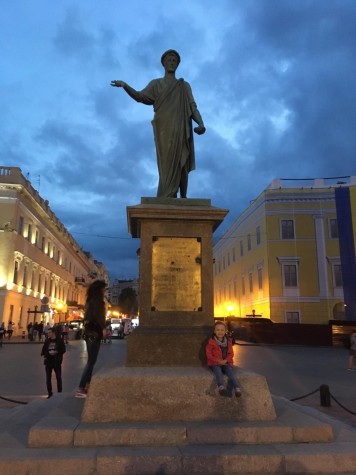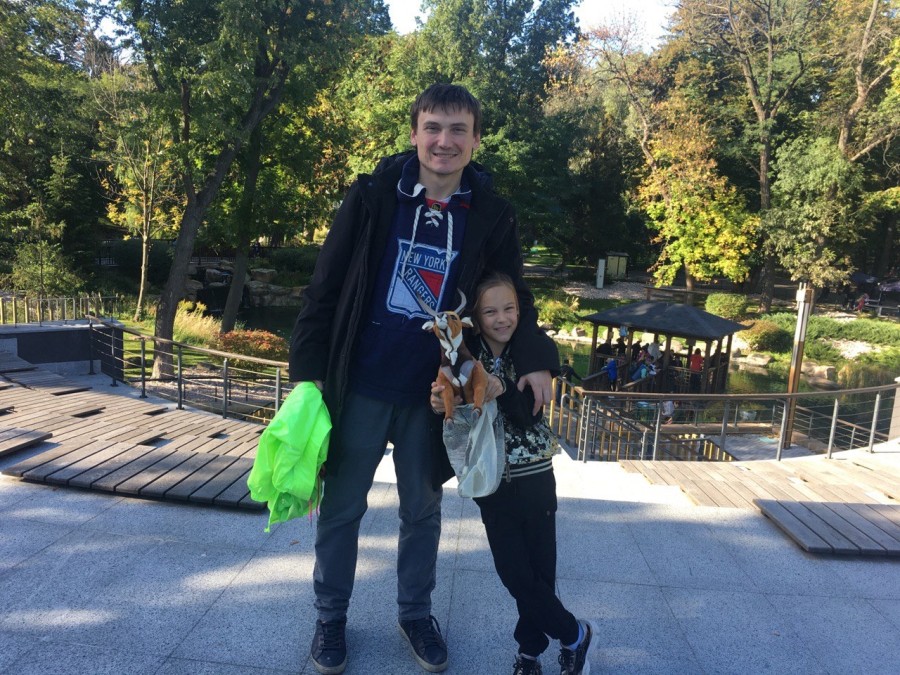Ukrainian and Russian students, alums displaced by the invasion
Here’s how members of the NYU community in New York, Russia and Ukraine are responding to the Russian invasion.
Yuriy Fedchyshyn and his daughter, Mariya, before the war in Ukraine began. (Image courtesy of Yuriy Fedchyshyn)
May 3, 2022
Yuriy Fedchyshyn, who graduated from the NYU School of Law in 2013, lives in Khmelnytskyi, Ukraine, with his young daughter, Mariya. Fedchyshyn, the former adviser to Ukraine’s prime minister on fiscal and trade policies, is one of many Ukrainians who have remained in the country despite the war.
“My main reason was that unless we lose or something irreversible happens, I don’t want to live somewhere else,” Fedchyshyn said. “If there’s a time where we will need to leave, then it would be for a good reason, but not just to run away. I don’t want this for myself.”
Since Russia invaded Ukraine in February, around 5.5 million people have fled Ukraine for neighboring countries. But many citizens, including Fedchyshyn, have remained in the country for personal reasons or as a result of martial law, which allows military officials to temporarily govern, and an order prohibiting males between the ages of 18 and 60 from leaving Ukraine.

Fedchyshyn’s family lived in their home in Kyiv at the start of the war before moving to Khmelnytskyi, a city around three hours west of the Ukrainian capital. He said he often heard artillery fire and took cover in bomb shelters several times in Kyiv when the war first started.
“The siren alarms were a very disturbing experience,” he said. “You could hear it wherever you were in the city because it was being bombed by ballistic missiles. When the sound went off, most of the people usually hid in the shelters within the first week or two.”
Sasha Kurlenkova, a Steinhardt Ph.D. student, was forced to leave Russia on March 1 after she participated in an anti-war protest and was taken to court. She said that since most of the war protesters in Russia and Belarus are students, they are in a difficult position of potentially having to leave the country at any moment.
“Many liberal social scientists have been involved in either direct action in the streets or they’ve been — some of my colleagues were — printing out the news about the war daily and at night,” Kurlenkova said. “Russian and Belarusian anti-war scholars have these risks of being either fired for their views or being even put in prison. And I felt there is this need to help these people because I’m studying at a prestigious university — NYU is one of the richest universities in the world with a lot of the global venues.”
Many schools in Kharkiv, the second-largest Ukrainian city, have been destroyed since the beginning of the war. Kurlenkova said that many Ukrainian scholars have been left unemployed after moving to the city of Lviv, which is about 43 miles away from Poland’s border, or leaving the country for other cities across Europe.
Kurlenkova sent a letter to NYU president Andrew Hamilton asking the university to distribute resources from the Institute of International Education’s Scholar Rescue Fund — which provides fellowships to threatened and displaced scholars around the world — to aid students affected by the invasion in Ukraine, Russia and Belarus. In the letter, Kurlenkova explained that since they have publicly denounced the war and have fled Ukraine, they are in need of assistance.
“Ukraine’s future depends not only on its military but on friends around the world who can provide a home for its best minds, the people who will rebuild the country in the future,” the letter reads. “Please join us and bring the full force of institutional support to do all we can to help right now.”
Josh Taylor, NYU’s associate vice chancellor for Global Programs and Mobility Services, released a statement last month explaining the steps that the university is taking in response to the crisis in Ukraine. The university has planned to establish immigration support, housing assistance, and employment and academic opportunities for students and scholars affected by the war.
As part of the efforts outlined in the statement, NYU announced a new partnership with the Kyiv School of Economics. The agreement will allow for combined educational, cultural and research activities and create faculty and graduate student exchange programs.
Tymofii Brik, the acting wartime vice president of International Affairs at the Kyiv School of Economics and a former Fulbright visiting scholar at NYU, said that he and his girlfriend volunteered in their Kyiv neighborhood by delivering medicine to the elderly. He said that although he feels safe in Kyiv, which he believes is well protected, he is concerned that Russia will eventually destroy the city.
“It is my home and I cannot imagine leaving it voluntarily,” Brik said. “I can be forced from it, I can be evacuated. But I cannot imagine leaving without at least trying to do something for the city and local community.”
Denys Fenchenko, a first-year graduate student at the Tandon School of Engineering, said his parents and brother are currently living in Kyiv. He said his brother is unable to leave the country due to martial law, but that he also does not want to leave their parents behind.
“I was in favor of my family moving out of Kyiv when the war broke out, but my father thought it was safer to stay in the capital,” Fenchenko said. “I was also asking my mother to leave, but she didn’t want to leave my father, so she decided to stay with him.”
Brik said he feels like nowhere in Ukraine is safe. He is calling for peace and safety for all of the country’s residents.
“Every day I think about Kharkiv, Mariupol and the citizens of occupied cities like Kherson,” Brik said. “People there are very brave and they protest against the occupation, despite the danger. Sometimes I feel guilty for being safe, while so many other Ukrainians suffer.”
Contact Nicole Lu at [email protected].
























































































































































